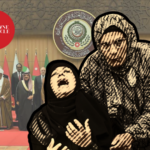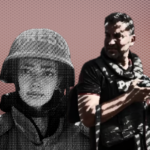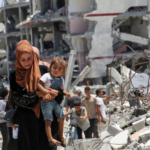Is There a plot to Depopulate Palestinian Refugee Camps in Lebanon?

Remains of Tel Zaatar camp. (Photo: Marion Kawas, supplied)
By Ramzy Baroud
An eerie video of a photo of one “Hajj Jamal Ghalaini” with a prayer on a backing track pops up occasionally on Facebook. The voice is that of an allegedly religious sheikh, praying for the well-being of the man in the photo for saving the Palestinian refugee youth of Lebanon by facilitating their departure to Europe.
The video would have been just another odd social media post, were it not for the fact that Ghalaini is a real person, with his name recurring in the ongoing tragedy of Palestinian refugees in Lebanon. Many have credited their successful “escape” from the country to this person who, they say kindly, has made the journey to Europe far cheaper than all other smugglers of desperate human beings.
We know little about Ghalaini, except that he seems to operate brazenly, without many legal repercussions from the Lebanese authorities or the Palestine Liberation Organisation (PLO), the supposed caretaker of Palestinian refugees in Lebanon.
Something very strange is going on.
Immediately after the Trump administration in the US began to promote its “Deal of the Century”, the issue of Palestinian refugees — fundamental to the Palestinian national struggle — once again took center-stage.
Although Trump’s plan is yet to be revealed fully, early indications suggest that it intends to remove Jerusalem entirely from any future discussions or agreement between Israel and the Palestinian Authority. The move of the US Embassy from Tel Aviv to Jerusalem and Trump’s own assertion that “Jerusalem is off the table” confirm this assumption.
Another component of Trump’s “deal” is to resolve the issue of refugees without their repatriation and without respecting international law, especially United Nations Resolution 194, which calls for the Right of Return for Palestinian refugees who were driven from their homes in historic Palestine in 1948, as well as their descendants.
Many news reports have been pointing to an elaborate American plot to downgrade the status of refugees, to argue against UN figures indicating their actual numbers and to choke off UNRWA, the UN agency responsible for the welfare of “Palestine refugees”, from badly needed funds.
Lebanon has been a major platform for the ongoing campaign targeting Palestinian refugees, particularly because the refugee population in that country is significant in terms of numbers and their plight is most urgent in terms of its need for a solution. Indeed, there appears to be an active plan, involving several parties, to deprive Lebanon’s Palestinian population of their refugee status and to circumvent the Right of Return.
To some, this may seem like wishful thinking, not least because such a right is “inalienable”, and thus non-negotiable. Yet, obviously, without refugees demanding their legitimate right collectively, the issue could easily move from being an urgent, tangible demand into a sentimental wish that is impossible to achieve. This is why the depopulation of Lebanon’s refugee camps, which is happening at an alarming rate, should worry Palestinians more than any other current issue.
I spoke to Samaa Abu Sharar, a Palestinian activist in Lebanon and the director of the Majed Abu Sharar Media Foundation. She told me that the topic of conversation among refugees has changed in recent years. “Whereas almost everybody from young to old once spoke about their wish of returning to Palestine one day,” she explained, “at present the majority, particularly the youth, only express one wish: to leave for any other country that will accept them.”
It is common knowledge that Palestinian refugees in Lebanon are marginalized and mistreated more than most when compared with other refugee populations in the Middle East. They are denied most basic human rights enjoyed by Lebanese citizens or other foreigners in Lebanon, and even rights granted to refugees under international conventions. This includes the right to work, as they are denied access to 72 different professions.
Apparently abandoned in a hopeless situation, with a life of neglect and utter misery in 12 UN-registered refugee camps and a number of unofficial “gatherings” across Lebanon, Palestinian refugees have striven to better themselves for many years, driven by the dream of going back to their homeland one day.
However, the refugees and their Right of Return are no longer a priority for the Palestinian leadership. In fact, this has been the case for nearly two decades, and now the situation has worsened. Since the start of the Syrian war in 2011, tens of thousands more refugees have flooded the camps, which already lacked most basic services. Their misery was accentuated further when UNRWA, under intense US pressure and funding cuts, was forced to cancel or downgrade many of its essential services upon which refugees depend.
A suspiciously-timed census, the first of its kind, by the Lebanese Central Administration of Statistics and conducted jointly with the Palestinian Central Bureau of Statistics last December, resolved that the number of Palestinian refugees in Lebanon stands at only 175,000. The timing was interesting because the survey was conducted at a time that the US Administration was keen to reduce the “official” number of Palestinian refugees in anticipation of any future agreement between the PA and Israel. According to UNRWA statistics, though, there are more than 450,000 Palestinian refugees registered with the agency in Lebanon alone.
There is no denying that there has been an increase in the number of Palestinian refugees wanting to leave Lebanon. Some have done so successfully, only to find themselves contending with the stigma of refugee status in Europe. As expected, some have returned.
Clearly, there are those who are keen to rid Lebanon of its Palestinian population. Hence, the official disregard for the likes of Ghalaini and their human trafficking networks.
“There is more than one organized network facilitating the migration of Palestinians at prices that have recently gone down to make it more accessible to a larger number of people,” Abu Sharar told me. The conclusion that many of these young men and women refugees now draw is that, “There is no future for them in Lebanon.”
This is not the happy, triumphant ending that generations of Palestinian refugees in Lebanon have hoped and fought for over the years.
Ignoring the miserable plight of Palestinian refugees in Lebanon is now coming at a heavy price. Relegating their plight to “final status negotiations”, a pipe dream that never materialised, is now leading to a two-fold crisis: the suffering of hundreds of thousands of people is getting worse, and we are witnessing the systematic destruction of one of the main pillars of the Palestinian struggle — the refugees’ inalienable Right of Return.
– Ramzy Baroud is a journalist, author and editor of Palestine Chronicle. His forthcoming book is ‘The Last Earth: A Palestinian Story’ (Pluto Press, London). Baroud has a Ph.D. in Palestine Studies from the University of Exeter and is a Non-Resident Scholar at Orfalea Center for Global and International Studies, University of California Santa Barbara. His website is www.ramzybaroud.net.



































0 Comments